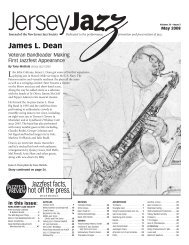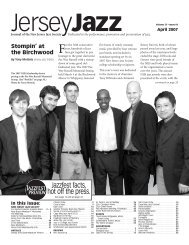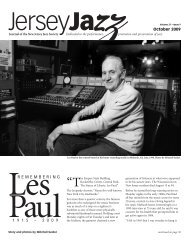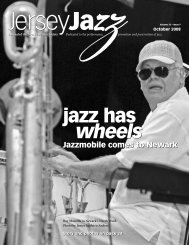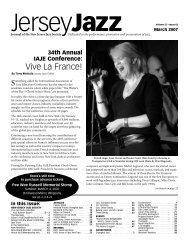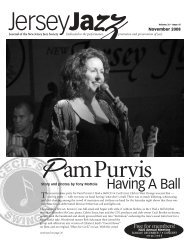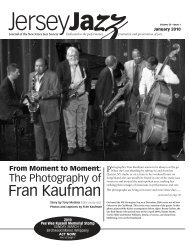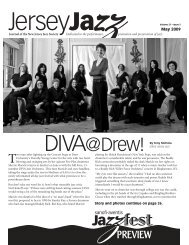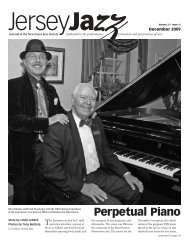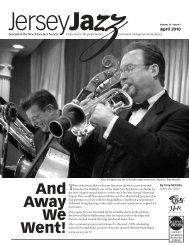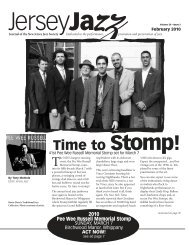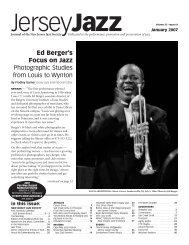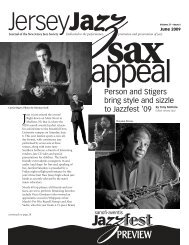He's Back! - New Jersey Jazz Society
He's Back! - New Jersey Jazz Society
He's Back! - New Jersey Jazz Society
Create successful ePaper yourself
Turn your PDF publications into a flip-book with our unique Google optimized e-Paper software.
wo things I can live very well<br />
Twithout are personal war<br />
recollections and record reviews.<br />
Yet these two seemingly disparate prejudices<br />
constitute the basis for this month’s little piece<br />
for members of NJJS. With the hope that two<br />
negatives will make a positive or, perhaps<br />
better, that two wrongs will make a right,<br />
I’m this month violating two of my own<br />
better judgments to send you this offering<br />
along with best wishes for the <strong>New</strong> Year.<br />
Still with me? I’ll be as brief as possible.<br />
Following my enlistment at the beginning<br />
of this country’s involvement in WWII, I<br />
spent most of 1942 in a special Signal Corps<br />
training school at Fort Monmouth. Upon<br />
completion, I spent a year at national<br />
headquarters in Washington and then went<br />
on to a couple years of service in General<br />
Stilwell’s headquarters in <strong>New</strong> Delhi. Our<br />
office worked very closely with a corresponding<br />
service of the British Air Force,<br />
also headquartered there.<br />
One day, on official business, an officer<br />
of the RAF visited our compound. It so<br />
happened that I had been having a<br />
discussion with another person in my<br />
department about music, and in that<br />
discussion I mentioned my personal<br />
liking for the piano playing of Earl Hines.<br />
At that moment WWII was temporarily<br />
placed on hold as the British officer,<br />
overhearing my remark, dropped official<br />
business and said, “Well, I’ll second that<br />
opinion, too.”<br />
This is how I met Britain’s very important<br />
jazz critic Sinclair Traill and, through him,<br />
one of the most exciting jazz pianists I’ve<br />
ever heard.<br />
About the time that this little exchange took<br />
place, the US Information Service set up an<br />
Armed Forces Radio Station in <strong>New</strong> Delhi.<br />
Part of the package was a tremendous<br />
February 2009<br />
Classic Stine<br />
By Jack Stine<br />
NJJS President Emeritus<br />
<strong>Jersey</strong>Articles<strong>Jazz</strong><br />
Stilwell, <strong>New</strong> Delhi…and all that jazz.<br />
supply of recorded music, and desiring the<br />
opportunity to check out what was in it I<br />
offered to be the station’s early morning disc<br />
jockey. Every morning from 6 ’til 8:30, I was<br />
in a dream world of the best of jazz and<br />
popular music of the time. The AFRS<br />
station — VU2ZY were the call letters —<br />
was a pretty modest rig. It had a radial range<br />
of about 100 miles, just inclusive enough to<br />
include about all of the service operations in<br />
central India. Airplanes used our signal to<br />
home in on at Delhi, and that drove the<br />
official operations at the airport crazy, but it<br />
was a crazy theater of operations anyway so<br />
it all fit in very nicely.<br />
The day I met Sinclair Traill in our office he<br />
of course knew who I was because of my<br />
morning radio program. On the other hand,<br />
he himself had a regular weekly radio<br />
program of jazz that emanated from the<br />
BBC studios in <strong>New</strong> Delhi. One of the<br />
differences in our respective shows was that<br />
his went as far as South Africa, Australia,<br />
and Singapore while mine could only go<br />
about 50 miles in either direction.<br />
Another difference in our programs was that<br />
Sinclair had enlisted the services of a young<br />
private from the RAF ranks to play piano<br />
examples of various jazz styles he had<br />
programmed. The fellow’s name was Lennie<br />
Jacobus and he had a talent that could only<br />
be described as prodigious. Plainly he had<br />
listened carefully to the recordings that<br />
reached Britain before the war, and he could<br />
ape the various styles of Teddy Wilson, Art<br />
Tatum, Jess Stacy, and of course the player<br />
who had instigated our friendship in the<br />
first place, Earl Hines.<br />
I was Sinclair’s guest on his program many,<br />
many times during my two years in <strong>New</strong><br />
Delhi and during those times Lennie and<br />
I became fast friends. He was a skinny,<br />
nervous guy, had trouble standing still or<br />
sitting quietly. Always he seemed to be<br />
listening to music in his own mind, nodding<br />
…as any surviving<br />
veteran will recall,<br />
friendships<br />
fashioned during<br />
the service were<br />
pretty fragile things.<br />
in agreement, while his fingers seemed to<br />
work their own filigree accompaniment to<br />
music that only he could hear. When he<br />
talked, it was the sound of a syncopated<br />
delivery, rapid fire yet totally understandable<br />
and perfectly logical.<br />
Countless evenings after VU2ZY had gone<br />
off the air, Lennie and I would go into the<br />
station and play recordings from the<br />
station’s trove, often until it was almost time<br />
for me to go on the air at 6. The station<br />
owned a nifty olive drab Steinway upright<br />
and Lennie loved the instrument, would<br />
often hang on long enough to play a few<br />
things on the air during my program from<br />
6 to 8:30. We had a great relationship, but,<br />
as any surviving veteran will recall,<br />
friendships fashioned during the service<br />
were pretty fragile things. People shipped<br />
out at the army’s discretion, breaking old<br />
bonds and setting up new ones. Better still,<br />
wars sometimes ended and soldiers went<br />
home to the certainties of civilian life.<br />
This last is how my friendship with Lennie<br />
Jacobus ended. Having established what you<br />
might call squatters’ rights to my place in<br />
<strong>New</strong> Delhi by way of being one of the first<br />
US soldiers to arrive there, I was abruptly<br />
put on the first troop ship after the Japanese<br />
surrender to return to the States. I didn’t<br />
even have a chance to say good-bye to<br />
Lennie Jacobus, and I never saw him again.<br />
But the story isn’t quite finished.<br />
It will be next month.<br />
JJ<br />
__________________________________ 9



